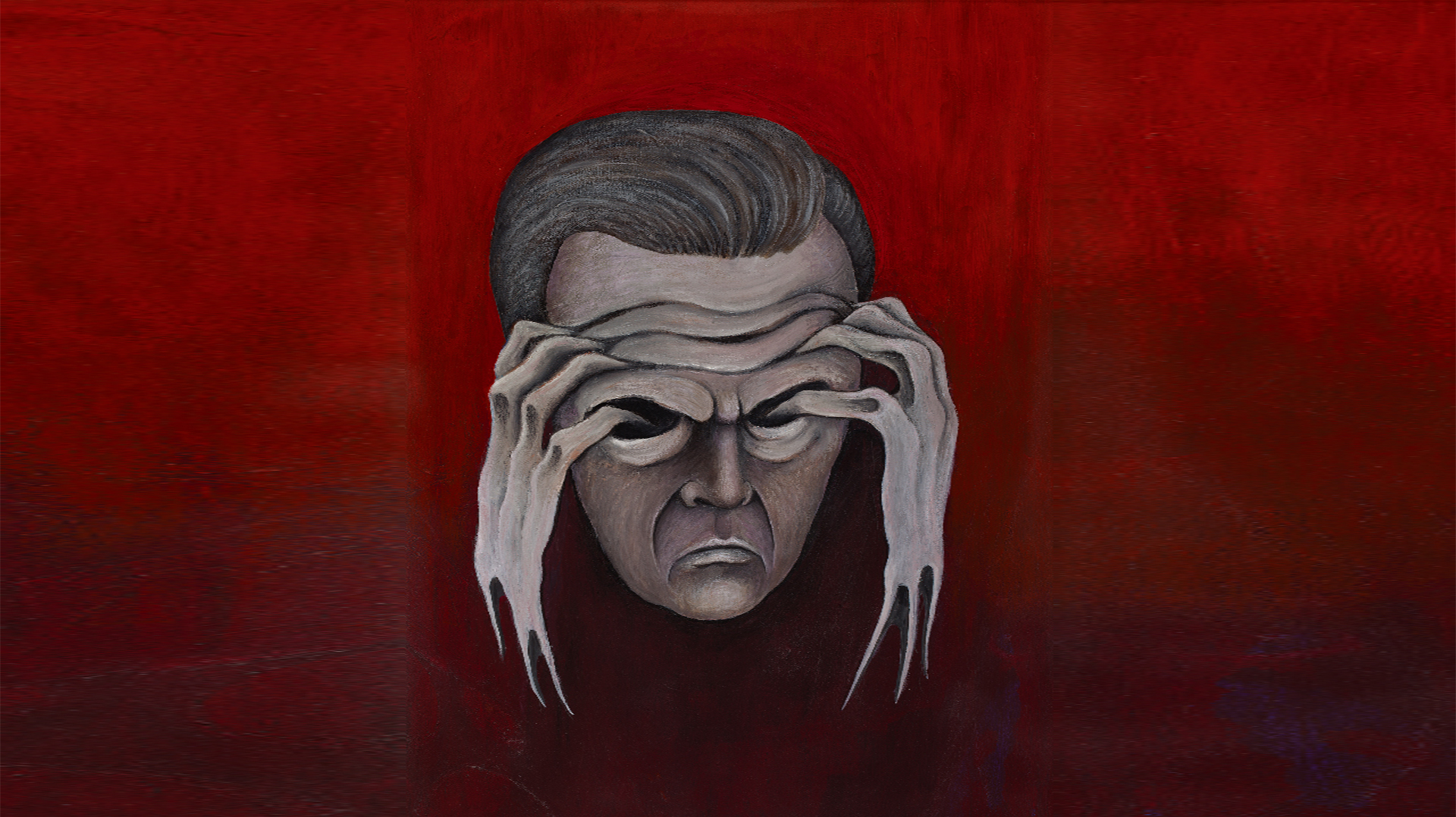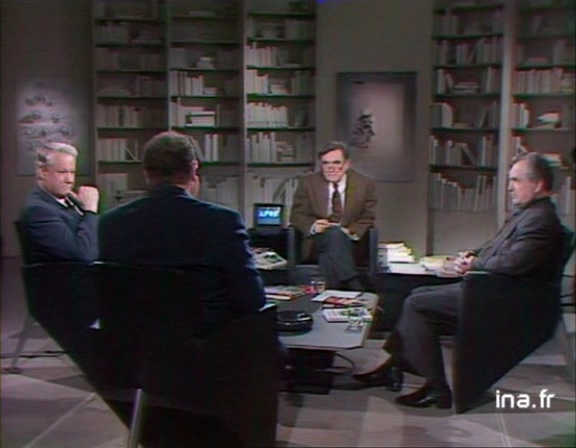
The Hegemon’s quest for world domination is made possible by an unquestioning public
Professor emeritus, University of Glasgow Michael Kirkwood continues with a series of articles about the life and works of the brilliant postwar Russian philosopher, author, and dissident, Alexander Zinoviev.
In this extract from his autobiography, obvious parallels are drawn between the state of the gerontocratic Brezhnevian Soviet Union and that of the polis in today’s so called ‘free world’.
lllustrations are by Zinoviev himself, provided to RI by his family.
Previous articles in the series are: The End of Communism in Russia Meant the End of Democracy in the West and Zinoviev to Yeltsin in 1990: “The West Applauds You for Destroying Our Country” , This Great Satirist Gloried in the Absurdities of the USSR (Alexander Zinoviev), Gorbachev Might as Well Have Been Working for the CIA
This week’s selection is a text from the updated edition of Alexander Zinoviev’s semi-autobiographical ‘Confessions of a Renegade’, published in Russian in 2008. The earliest version of this work was first published in 1990.
In the publisher’s note to this 2008 edition the work is described as having the qualities of a) a novel of adventure, b) a deeply scientific tract. The text in question has features of b) rather than a).
At the time of writing I am unable to put an exact date on when the text was written, but I suspect from the contents that it was written probably before he returned to Russia in 1999. I have chosen it because it briefly outlines a twin theme that runs like a thread through his entire output, namely the nature of Soviet communism and the West’s inability to understand it.
It also presages his final and monumental work, which he managed to complete just before his death in May 2006, namely The Comprehension Factor (as yet unfortunately unavailable in English). It is his magnum opus in which he systematically develops a scientific theory of understanding (or comprehending) based on his professional work in the field of many-valued logic, sociology, and global politics.
In the text below we already get an intimation of a theme which he will go on to develop in breadth and depth over the last fifteen years of his life, namely the West’s determination to dumb down the planet in the quest for world domination under the guise of ‘globalisation’.
Michael Kirkwood
A Question of Comprehension
How many times have I had to listen to people telling me that my books are scarcely, or indeed completely, incomprehensible to the western reader!
I have tried with all my might to elucidate my ideas. I spent decades in schools, institutes and universities as a teacher and professor. It seemed to me that I had learned how to explain in simple terms the most complex problems to the dimmest students and school learners. But here, in the West, something strange has been going on: the more I tried to explain some event or other described in my books, or the ideas in them, the less I was understood.
What is the reason for this state of affairs, which at first surprised me, then upset me, then insulted me and finally reduced me to a state of hopeless despair and indifference? Millions of people read fantastical novels stuffed full of utter rubbish, but no one talks about of the incomprehensibility of what they have read, although an elementary test of their comprehension would reveal a score bordering on zero.
Millions of people read books and articles by western journalists, diplomats, political experts and sovietologists, which as a rule are 50% absurd and 50% more or less not susceptible to comprehension, but again no one talks about the incomprehensibility of what they have read. Books that are regarded as comprehensible are books on the lives of people in Ancient Egypt and China, the Incas and Papuans. Even books about ants and mice do not appear to be incomprehensible, although not one reader has spent even a day in an anthill or a mouse hole.
There is but one exception to this rule: Russia. The more truthfully, accurately, comprehensively and profoundly an individual writes about Russia, the less he encounters comprehension on the part of the reader. Where is the riddle? Perhaps it has nothing to do with the inability of the author to explain his material meaningfully, but also nothing to do with the inability of the reader to comprehend a description of little-known, or completely unknown phenomena?
The crux of the matter is a lot more serious than ‘incomprehension’. References to ‘incomprehension’ merely obscure the crux.
Let’s start with this question: Are the facts of soviet life that I describe in my books really all that new and unfamiliar to western people? The overwhelming majority of the phenomena I describe in one form or another, to one degree or another, I also observed in the West. I not only observed them, I experienced them personally as a writer and simply as an ordinary human being who has to earn his daily bread in that capacity.
I met a distinguished French professor in 1978 who told me that my description of the Soviet academic environment was absolutely applicable to France. This was one of the very rare occasions when a western reader recognized the universal human character of the life events I described.
The great majority, however, regarded my description as some kind of social monster created in Russia by Bolsheviks according to a Marxist plan. My Western readers and critics did not wish to see in my description traits of their own society and themselves as individuals, and were reluctant to see a glimpse of their own future, if only in outline, to which they themselves were being ineluctably drawn.
Having lived in the West for ten years and having observed western society closely and from the inside, I became more and more confident in an idea which I had previously avoided expressing in categorical terms, namely that communist society offers a key to an understanding of contemporary Western society as well.
Phenomena in the West which as yet exist as tendencies only, which are mixed in with phenomena of different types (such as pluralism, democracy, ideological chaos) and which can only be discussed in abstract terms, can be observed in the Soviet Union in almost laboratory conditions.
All of my books are basically devoted to universal aspects of the human condition, which, in the environment of contemporary Russia, have developed in a notably vigorous way, perhaps even to an excessive degree, which have become enormously important in people’s lives and which manifest themselves with an almost naked clarity. As I have noted more than once in my books, these phenomena are old acquaintances, which are playing, however, new roles in the environment of a communist society.
It is not the case that my readers are incapable of understanding my books because of the unfamiliar events that are described in them, but that they do not wish to see in the ‘mirror’ of soviet life the reflection of the deeply buried mechanisms governing their own life and elements of their own future.
Understanding social life as an aspect of human psychology is not just some kind of impartial academic understanding for which marks are awarded in schools and universities. Understanding is a heavy burden to carry throughout ones life. Understanding brings with it anxiety and disquiet. It imposes a multi-lateral commitment. It fosters and develops a feeling of responsibility for what happens now and in the future.
A lack of understanding on the other hand relieves the individual of the burdensome sense of responsibility and from the feeling of complicity with what is happening. It gives the individual a sort of alibi.
This explains why the aspiration actively not to understand the essence of contemporary society, its hidden mechanisms and objective tendencies, has become the dominant force in the intellectual conditioning of Western society. People are prepared to spend time on anything except laboring over books which will land them with the burden of cognition of ugly reality. People are prepared to stuff their heads with anything but bitter and merciless truths.
Striving after the painful truth has become the fate of exceptionally rare loners. I have devoted my whole life to the task of understanding the deepest evolutionary mechanisms of contemporary society. I know the gulf of despair into which the individual who gains an understanding of these mechanisms is plunged. Therefore I do not at all pass judgment on my Western readers who do not wish to understand my books, nor on those who do not want to read them anyway. I merely categorically reject any reference to ‘incomprehensibility’.



